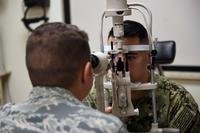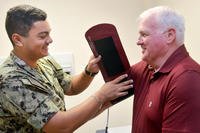 MILITARY UPDATE: VA Chief: 'Tens of Thousands' More Medical Staff Needed
MILITARY UPDATE: VA Chief: 'Tens of Thousands' More Medical Staff Needed
The Department of Veterans Affairs needs “tens of thousands” more personnel working in VA hospitals and clinics to meet patient demand, the new VA Secretary, Robert “Bob” McDonald, told lawmakers Tuesday at a hearing of the Senate Veterans Affairs Committee.
The size of the staff shortage, McDonald said, explains why VA has launched “a big recruiting effort” which he kicked off recently with visits to Duke University and University of Pennsylvania medical schools to tell students there why “VA is where they want to work.”
Congress is pressing to clarify the VA staff shortage as the department struggles to recover from a patient wait-time scandal, as demand for care grows due to a force drawdown, and as the nation at large also copes with a shortage of health workers, particularly in mental health care.
McDonald got more specific than some senators expected, at one point estimating the VA staff shortage at 28,000 against current staffing of 300,000. McDonald attributed that figure to his deputy, Sloan Gibson, who was acting secretary after retired Army Gen. Eric Shinseki resigned in May.
When 28,000 elicited a “Wow” from Sen. Bernie Sanders (I-Vt.), committee chairman, McDonald added that it includes both “clinicians and other employees.”
Sen. Jon Tester (D-Mont.) later challenged the figure, telling McDonald VA can’t hold a reliable number on its medical staff shortage before it completes an ongoing study of staff productivity and patient demand.
“How can you make a determination that you need 28,000 medical staff,” Tester asked. “I mean you’re a wonder-worker, probably, but in fact that information still hasn’t been hammered out.”
McDonald conceded the point.
“We are going through a process right now,” the secretary acknowledged, “where we are, location by location, specialty by specialty, [trying] to understand how many people we really need.”
Carolyn M. Clancy, a physician and interim under secretary for health at VA, is leading that process. She told Tester it should be completed by year’s end and will show both the number of clinicians VA needs and support staff “to make them as efficient and productive as possible.”
A VA spokesperson later said the 28,000 estimate is rough, and reflects both current staff vacancies as well as future need for more physicians, nurses, other care providers and administrative staff.
Tester asked what VA would even do with more physicians given how tight office space is at VA clinics and hospitals.
“Where are you going to put these doctors,” he said, citing examining room shortages across VA including facilities in his home state.
“Obviously you’re right,” McDonald said.
The Veterans Access, Choice and Accountability Act of 2014 enacted last month allows VA to open 27 more clinics. McDonald said he also favors leasing more space to deliver care “rather than building” facilities for a veteran population that tends to move over time.
McDonald listed VA actions since May, and during his first five weeks as secretary, aimed at restoring the confidence of veterans and the nation in what has been a scandal-ridden VA health system. He praised the vast majority of employees dedicated to serving veterans and providing timely, quality care. He vowed that those who don’t put veterans first won’t be tolerated, and whistleblowers will be protected and even urged to expose wrongdoing.
Sanders held the hearing to review the final report of VA Inspector General on abusive scheduling practices uncovered at the VA hospital in Phoenix. Those practices hid staff shortages, impacted patient care and led the IG to open investigations at 93 other VA care facilities. Sanders called the behavior uncovered “inexcusable,” particularly that so many executives and senior clinicians knew about manipulation of wait time data.
“The people who lied or manipulated data at Phoenix and elsewhere must be held accountable,” Sanders said.
Patient care suffered as a consequence, Acting VA Inspector General Richard J. Griffin testified. His office examined medical records and other information for 3,409 patients, which included 293 deaths. It identified 28 instances of “clinically significant delays in care” tied to access or scheduling. Of these, six patients died. The IG found another 17 cases of care deficiencies unrelated to scheduling or access. Of these, 14 died.
However, the IG could not “conclusively assert that the absence of timely quality care” caused any deaths at Phoenix VA, Griffin testified.
That upset Sen. Dean Heller (R-Nev.) who said 77 patients on waiting lists across VA since January 2012 committed suicide. Wouldn’t “a reasonable person” conclude wait-time manipulation contributed to some of those deaths?
Griffin said his staff is “not in the business of making odds on whether something did or didn’t cause a death, whether it’s likely or unlikely, 50 percent, 30 percent, 80 percent. That’s not our purpose.”
John D. Daigh, assistant IG for VA healthcare inspections, said investigating physicians looked at “fact patterns” of every death. But “if you are on a waiting list for audiology and you happen to die of a cardiac problem, the wait list factor was not very important.”
“I don’t want to give the VA a pass on this,” Heller said, “and I believe it’s what this line does. It exonerates the VA of any responsibility in past manipulation of these wait times.”
“I just have to disagree,” said Daigh. “I described 45 cases, 28 of which were negatively impacted because of delays. The only argument is I can’t say that those that died, died because of the delay.”
“We have already concluded there was poor quality of care,” Griffin explained for another senator. Whether malpractice occurred is for courts to decide or for VA to consider, he added, “which is why we provided them with the 45 names and said you need to look into these...”
Send comments to Military Update, P.O. Box 231111, Centreville, VA, 20120, email milupdate@aol.com or twitter: Tom Philpott @Military_Update
# # # # #
Tom Philpott has been breaking news for and about military people since 1977. After service in the Coast Guard, and 17 years as a reporter and senior editor with Army Times Publishing Company, Tom launched "Military Update," his syndicated weekly news column, in 1994. "Military Update" features timely news and analysis on issues affecting active duty members, reservists, retirees and their families.
Visit Tom Philpott's Military Update Archive to view his past articles.
Tom also edits a reader reaction column, "Military Forum." The online "home" for both features is Military.com.
 Tom's freelance articles have appeared in numerous magazines including The New Yorker, Reader's Digest and Washingtonian. His critically-acclaimed book, Glory Denied, on the extraordinary ordeal and heroism of Col. Floyd "Jim" Thompson, the longest-held prisoner of war in American history, is available in hardcover and paperback.
Tom's freelance articles have appeared in numerous magazines including The New Yorker, Reader's Digest and Washingtonian. His critically-acclaimed book, Glory Denied, on the extraordinary ordeal and heroism of Col. Floyd "Jim" Thompson, the longest-held prisoner of war in American history, is available in hardcover and paperback.
Beneficiaries who had to pay for any of these 35 tests since coverage first was denied back to Jan. 1, 2013, might be eligible for reimbursement. Send comments to Military Update, P.O. Box 231111, Centreville, VA, 20120, email milupdate@aol.com or twitter: Tom Philpott @Military_Update



